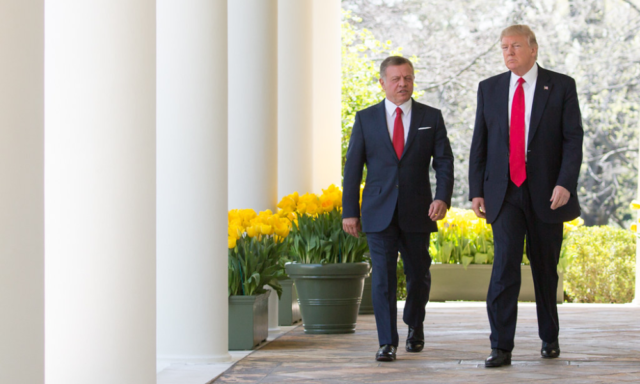Washington: U.S. President Donald Trump hosted Jordan’s King Abdullah II at the White House to discuss the ongoing crisis in Gaza. The meeting focused on Trump’s controversial plan for U.S. involvement in the region, which includes a proposal to take control of and redevelop Gaza.
Trump’s Vision for Gaza
Trump has been vocal about his idea to oversee Gaza’s reconstruction. Over the weekend, he stated, “I’m talking about starting to build, and I think I could make a deal with Jordan. I think I could make a deal with Egypt.” His remarks suggest that he is actively working to turn this ambitious idea into reality.
Pressure on Jordan and Egypt
Trump has hinted at leveraging U.S. aid to push Jordan and Egypt into accepting his plan. He has suggested that funding to both nations could be withheld if they do not agree to take in Palestinian refugees as part of his broader strategy. However, Arab leaders have rejected this approach, emphasizing that Gaza should remain under Palestinian control.
Call to Cancel Ceasefire with Hamas
The meeting also followed Trump’s strong stance on Israel’s conflict with Hamas. On Monday, he urged Israel to abandon its ceasefire deal and “let all hell break out” if Hamas does not release hostages by Saturday noon. His statement signals a more aggressive approach to handling the crisis, which could heighten tensions in the region.
Jordan’s Role in the Middle East
King Abdullah II has been a key figure in regional diplomacy, advocating for Palestinian rights and a two-state solution. Jordan, home to millions of Palestinian refugees, has consistently opposed any forced displacement of Palestinians. The meeting with Trump likely included discussions on how to handle the humanitarian crisis in Gaza while maintaining regional stability.
Global Reactions and Uncertainty
Trump’s plan for Gaza has sparked debate, with critics arguing that U.S. control of the territory is unrealistic and likely to face international opposition. Meanwhile, his hardline stance on Israel’s ceasefire adds another layer of complexity to an already volatile situation.
As Trump pushes his vision forward, the world watches closely to see how Arab leaders and Israel respond to his proposals. The future of Gaza remains uncertain, with diplomatic negotiations playing a crucial role in shaping what comes next.











